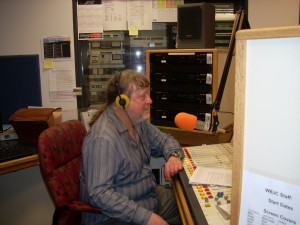TIME TO SAY GOODBYE
TIME TO SAY GOODBYE … (YOU SAY GOODBYE. I SAY HELLO.)
As of Monday, December 18th, I am no longer a classical music host on WBJC. After thirty-nine years and thirteen days, I am retiring. My last live broadcast was the Friday night request show on December 15th, followed by my pre-recorded Sunday afternoon show on December 17th.
When I arrived at WBJC in December of 1978, the station had just increased its power to 50,000 watts. At the time, WBJC had a diverse format, including jazz, Broadway shows, old time radio, and NPR news. But the classical music format was expanding, due to its popularity during fundraisers. Moreover, the two Baltimore classical music stations, WBAL-FM and WCAO-FM, had changed their formats. Baltimore Mayor WIlliam Donald Schaefer held a public ceremony, in which the WCAO-FM tapes, music with recorded announcements, that had been replayed with no variation, were handed over to WBJC, the radio station owned by the Community College of Baltimore.
The message was clear. WBJC would be Baltimore’s new classical music station. The WCAO tapes would remain on the top shelf of the WBJC record library for over a decade, and were never played. Frankly, they were crap, and WBJC quickly superseded them. And yet for another decade. many Baltimoreans who had enjoyed the endless repetition of WCAO’s tapes. denigrated the variety of WBJC. I learned very quickly that Baltimore, circa 1979, was a good old boy town. It didn’t matter how good you were, but how long you had been around.
Early in my career at WBJC, I played an opera and a choral work in the afternoon once a week. I played an hour of Japanese shakuhachi flute, and made an entire LP of Renaissance dance music into a station “hit”. I felt empowered to play “Voice of the Whale” by George Crumb during drive time, because so many listeners seemed to like it. When in later years, letter writers to the Baltimore Sun wrote about the empty headedness of WBJC programming, I learned how vapid the Baltimore arts community was. They weren’t even listening.
But eventually I was on the air long enough to be one of the good old boys myself. And the Baltimore arts community changed for the better. As did WBJC. The story of WBJC is too long for me to relate, but I do want to credit two people: our former General Manager Cary Smith, and our current Program Director Jonathan Palevsky. We have had our disagreements over the years, but Cary and Jonathan turned WBJC into a tight ship, and a major arts institution in Baltimore. With my help, of course.
As for memories, there are too many to mention. Here are a few. Putting together a show in the days before computers, with a sketchy record filing system. Scampering to find “an eleven minute piece for harp”, on vinyl at that, after editing and announcing the AP news, with just a few minutes to go before dead air. To this day, the Friday night request show is not all that different.
People running around during fundraisers in the 1980’s having conniptions, screaming who was to blame for us not reaching the last hour’s goal, while we announcers were trying to maintain our composure and energy for the next hour. Those days are long gone, thankfully. We learned that the key to fundraising is to give it our best, and not give a hoot about the results. Call it the Zen of fundraising.
One morning in the winter of 1979, I awoke to find my car buried in snow. I called WBJC to say I would be walking to work. At the time, I lived in Towson, and thought York Road would be an easier walk than Charles Street under several feet of snow. I started around 8:30AM, and arrived at work at 2PM, one hour late for my shift. I had walked nine miles. I embraced the jazz director, Robert Ford, who had filled in for me. (A few years ago, I Google-mapped the route, to find out how far I actually walked; it was 8.9 miles.)
This would not be the last time I would walk to work in the snow. Or sleep on the floor of the radio station lobby, because my car was stuck on ice in the parking lot. One night, I drove the length of two buildings, uphill through the CCB parking lot, only to get stuck on the speed bump by the main road. I walked back to the station, downhill, for the length of two buildings, cautiously looking for patches of snow to step on, so i would not slip and fall. It was one of the scariest moments of my life.
One night in the 1980’s, a young man phoned me to say the Rachmaninoff Piano Concerto No. 2 was beautiful. When I tried to spell it for him, he told me that he couldn’t read or write. I have never been prouder.
Listeners have told me a piece of classical music on WBJC comforted them when they lost a loved one. Having lost my wife four years ago, I can appreciate this.
Listeners have told me that hearing classical music on WBJC inspired their academic and career pursuits, musical or otherwise.
And more than one listener has told me they have been listening to me since they were in diapers.
I also am grateful and humbled when someone says they have heard classical music stations all over the country, and even the world, and think that WBJC is the best. My goal from the start was to share my love of classical music with other people who enjoyed it. I want to thank all of you who made it possible for me to do that, my listeners and my colleagues.
I could not have asked for a better life, than sharing classical music with the listeners of WBJC. And now, the next chapter in my life begins. Thanks to all of you.
Reed Hessler







74 Responses to TIME TO SAY GOODBYE